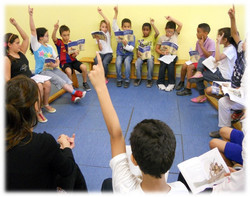Let school children speak
Western school teaching mainly involves teacher talk, with pupils having limited opportunity to discuss or contribute. A previous EU study (INCLUDE-ED, 2006-2011) showed that dialogic learning improves performance and developed a method for fostering a more egalitarian form of classroom interaction. The EU-funded CHIPE (Children's personal epistemologies: Capitalizing children and families knowledge in schools towards effective learning and teaching (ChiPE)) project aimed to test INCLUDE-ED's methods. Specifically, the team planned to determine whether the 'Successful Education Actions' would work in the United Kingdom. The study was further intended to test whether such application improved pupils' personal knowledge and beliefs via interaction with other students' views. Researchers studied six English and two Spanish primary schools, covering various locations, educational levels and socioeconomic circumstances. A total of 14 teachers, 13 other adults and around 350 students took part. Experiments showed a reversal of the standard teacher-pupil talk ratio, with 75 % of children doing about 80 % of the speaking. Such expression was usually complex and interactive, with children justifying their views using their existing cultural knowledge. Engagement was sustained for about an hour. The project team concluded that a pupil-focused dialogic environment improves academic achievement, produces complex linguistic constructs and encourages students to draw upon their knowledge. Furthermore, the technique was seen to produce discussion about moral, taboo and/or difficult topics, and yielded positive social relationships. Parents were strongly in favour and teachers were amazed at the students' level of engagement and enthusiasm. CHIPE outcomes included improved academic achievement, especially in economically deprived areas. Such results are socially beneficial and will help meet EU 2020 targets in terms of school attendance.
Keywords
School, school children, academic achievement, teacher talk, classroom interaction, dialogue

